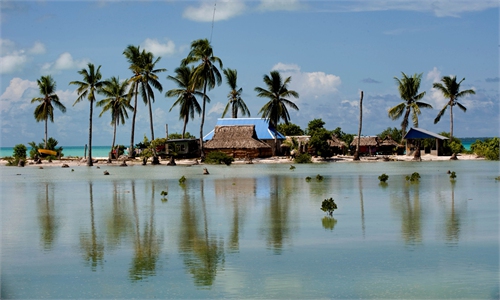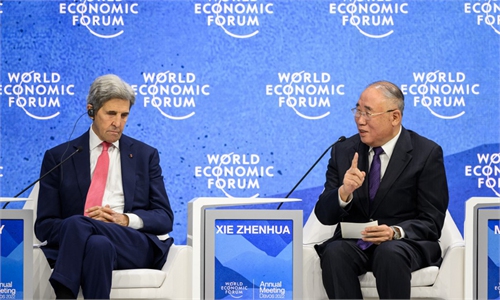China to offer technologies, equipment, training to help Pacific island countries tackle climate change: cooperation center director
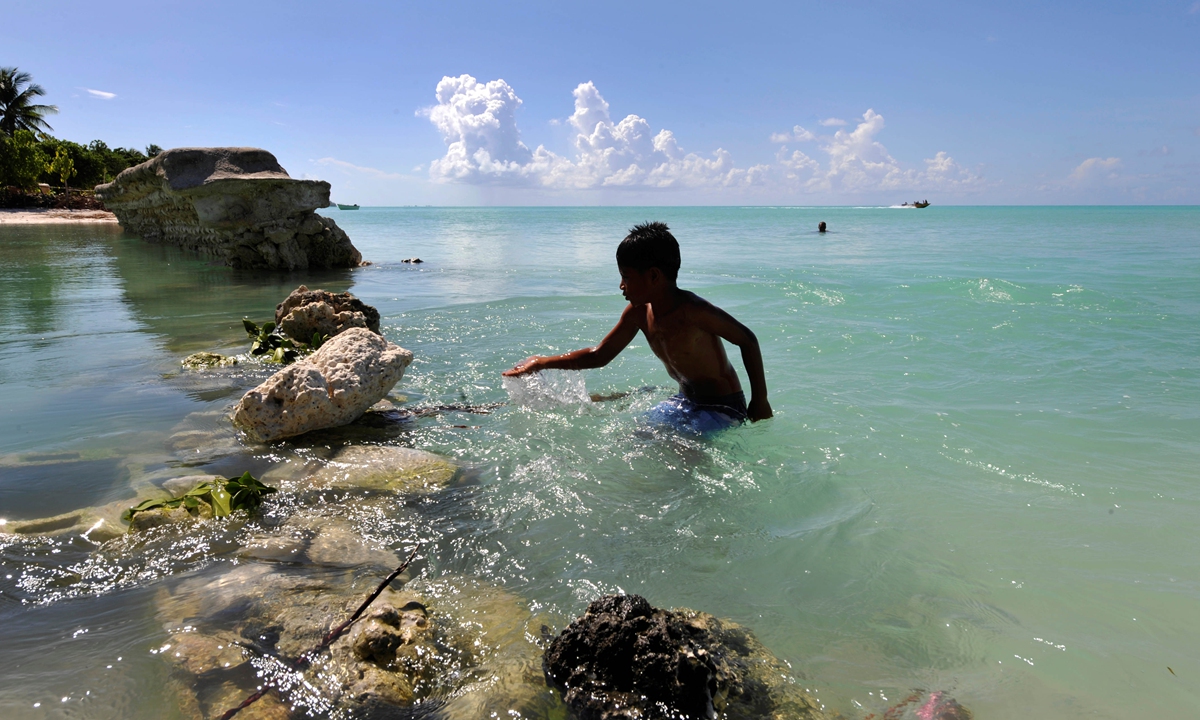
A boy plays at the sea wall in the village of Eita on the island of Tarawa, Kiribati. The sea wall has been destroyed by rising tides. Photo: VCG
Editor's Note:
Climate change has always been a major concern for the Pacific island countries, which can easily fall prey to global warming and rising sea levels. On Saturday, the parliament of Vanuatu declared a climate emergency.
During Chinese State Councilor and Foreign Minister Wang Yi's on-going visit to Pacific island countries, climate change was also an important topic. "China fully understands Pacific island countries' special concerns on the climate change issue and will continue to promote the comprehensive and effective implementation of the Paris Agreement," Wang said in Kiribati on Friday.
China has been working with Pacific island countries on issues concerning climate change and has seen a series of achievements, including the launch of the China-Pacific Island Countries Climate Action Cooperation Center, a milestone which is expected to enhance exchanges and practical cooperation between the countries involved.
The Global Times reporters Shan Jie and Zhao Juecheng (GT) recently talked to the executive director of the center Chen Dezheng (Chen), to see how China will lend a hand and carry out its responsibility to help island countries tackle climate issues.
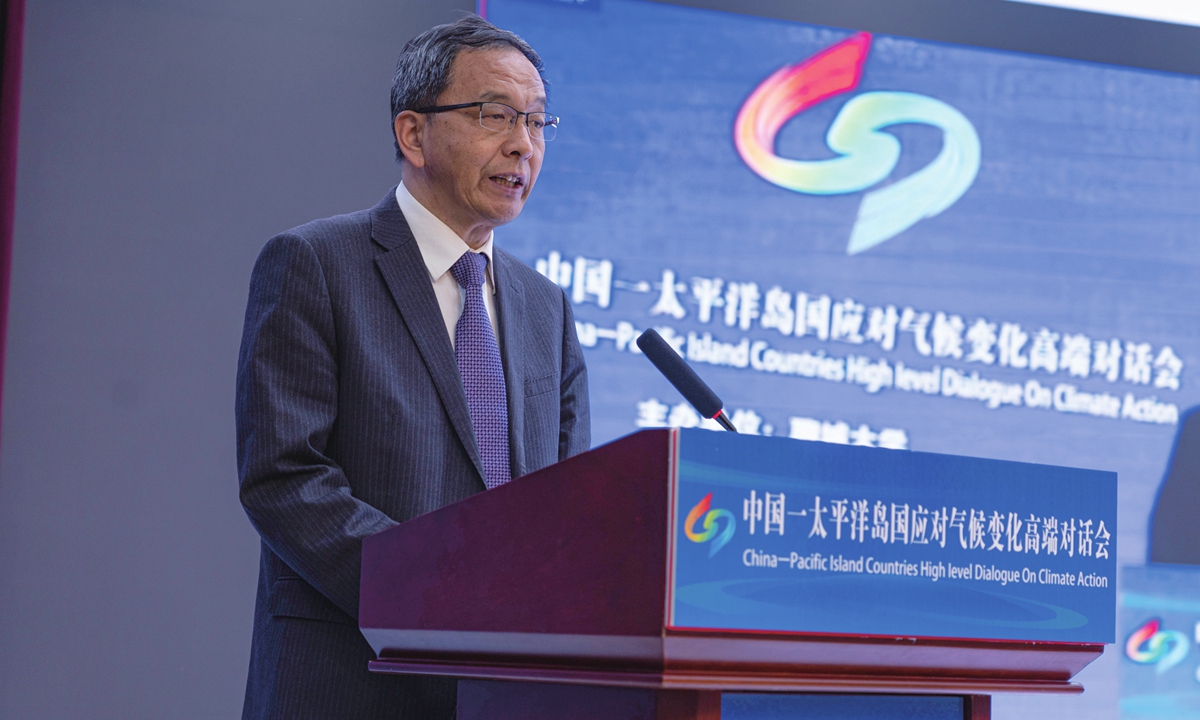
Chen Dezheng Photo: Courtesy of Chen
GT: The China-Pacific Island Countries Climate Action Cooperation Center was officially launched at the end of April. What was the impetus behind establishing the center?
Chen: In recent years, climate change has become a major global issue of general concern to the international community, and it has especially aroused great concern for the people of Pacific island countries. In order to implement the Belt and Road Initiative and the concept of "a community with a shared future for mankind," deepen the comprehensive strategic partnership of mutual respect and common development with Pacific island countries, jointly promote the full and effective implementation of the Paris Agreement, and build a fair and reasonable global cooperation climate governance system, in October 2021, State Councilor and Foreign Minister Wang Yi stated at the China-Pacific Island Countries Foreign Ministers' Meeting that China is willing to work with the island countries to address the challenges brought about by climate change, and proposed the establishment of a cooperation center. This proposal was also written into the joint statement by the ministers.
The China-Pacific Island Countries Climate Action Cooperation Center was jointly built by the Ministry of Foreign Affairs, the Ministry of Ecology and Environment, and the Shandong Provincial People's Government. Its office is located in Liaocheng, Shandong Province, and is run by the Liaocheng University, which has a tradition of studying Pacific island countries.
Currently, the center has a secretariat and three departments on reference for decision making, international cooperation, and talent training respectively.
GT: What kind of cooperation has the center already launched with Pacific island countries? What are your plans for the future?
Chen: Since the opening of the center at the end of April, the following cooperation has taken place.
First, the center signed a memorandum of understanding with the University of the South Pacific based in Fiji and the National University of Samoa, two well-known universities in the Pacific island region, on strengthening inter-school cooperation in climate change research. The involved parties will jointly hold academic conferences and strengthen mutual visits and exchanges between researchers.
High-level talks between China and Pacific island countries on climate change have also been held, which conducted fruitful exchanges and discussions on the status quo of climate change in Pacific island countries, especially China-Pacific cooperation to improve Pacific island countries' ability to cope with climate change.
China has also donated much-needed machinery and equipment to Kiribati and other Pacific island countries.
The center will help to hold a training session hosted by the Ministry of Ecology and Environment for island country officials, experts, and technicians in confronting climate change and carrying out green low-carbon development in late June. And online lectures delivered by the islands' experts are also on the agenda.
Next, the center will build a professional research team with talent from other academic areas such as world history, international politics and ecology, as well as scholars from Chinese Academy of Sciences and Fudan universities.
The center will work with the Institute of Atmospheric Physics of Chinese Academy of Sciences and the universities in the Pacific island countries to build "climate change simulation laboratory" and "climate disaster monitoring and early warning joint laboratory."
The center is expected to provide practical and varied cooperation, areas of study, and training on climate change issues.
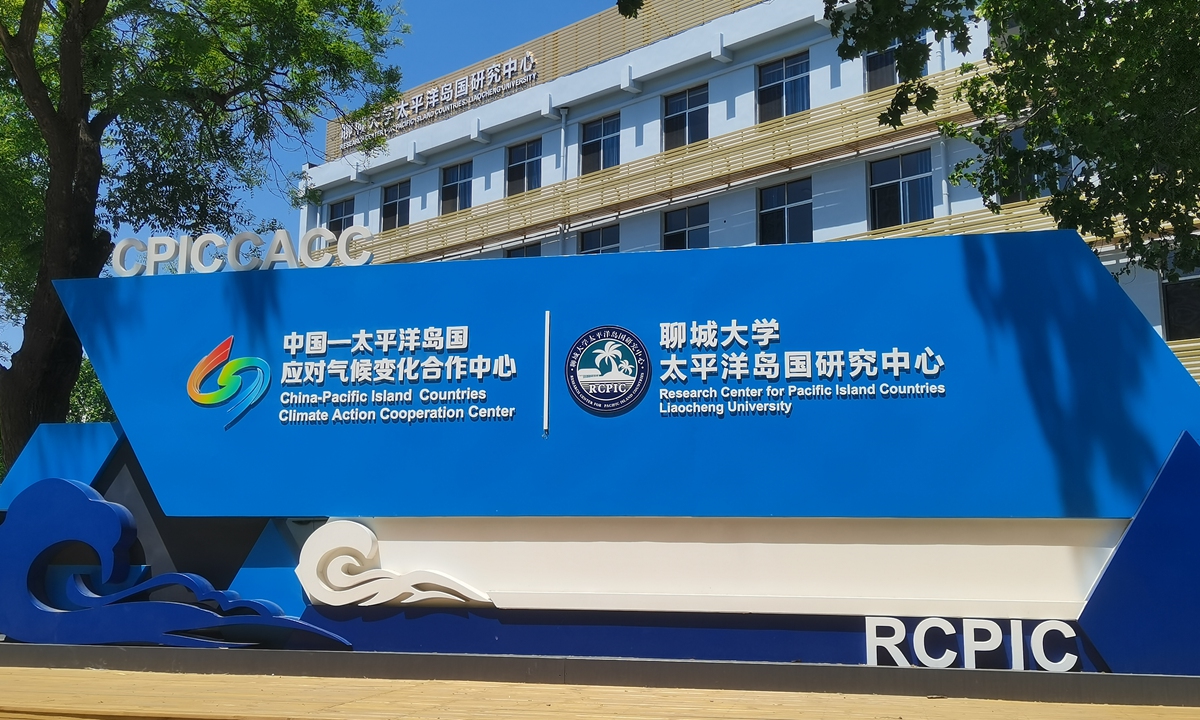
The China-Pacific Island Countries Climate Action Cooperation Center Photo: Courtesy of Chen
GT: In your opinion, what are the urgent problems that Pacific island countries face in tackling climate issues?Chen: First of all, Pacific island countries lack sufficient international discourse power. They are only innocent bearers of the evil consequences of climate change, while the initiators are countries outside of the region, especially developed countries. Due to this, island countries cannot fundamentally influence the big powers' policy on carbon issues and on global climate governance, thus making it more difficult for Pacific island countries to deal with climate change.
Second, there is a lack of funds to deal with climate change. International assistance is needed to meet basic needs in some of these countries, and it is difficult to raise sufficient funds to deal with climate change.
They also lack relevant infrastructure. In the short term, in order to reduce the impact of severe weather and prevent geological disasters, Pacific island countries still lack necessary meteorological monitoring and early warning facilities. In the long term, they will need new infrastructure to deal with the shrinking of livable space caused by rising sea levels.
They have not mastered the core technologies of climate response. Due to the influence of small countries with few people and a serious shortage of financial and human resources, Pacific island countries are not only unable to innovate in key technologies, but also lack theoretical research on climate governance, and are therefore without adequate knowledge support for climate change awareness.
Moreover, in the region, fossil fuel consumption is still the largest sources of energy, making Pacific island countries powerless in urging other countries to cut down the use of fossil energy and reduce carbon emissions.
Therefore, Pacific island countries should expand the scope of exchanges and cooperation. They should cooperate with supporters of climate change to increase their discourse power on the subject.
They could also change the traditional marine management model, to rent out marine space in exchange for necessary economic support, and require the lessee to manage the region with high standards. Infrastructure should also be upgraded, such as the comprehensive garbage disposal and new livable areas found to reduce the pressure on ecology and the environment.
They should also promote comprehensive cooperation with other small island countries in marine governance to develop climate change responses.

A Chinese expert with Samoa students Photo: Courtesy of Chen
GT: As a developing country, what practical and targeted assistance can China provide to island countries in terms of technology and equipment?Chen: China is an ancient civilization. The concept of harmony between man and nature is an important part of traditional Chinese culture, which could serve as an important reference point for Pacific island countries to adapt to climate change.
Moreover, most of the Pacific island countries are coral islands and reefs, and land resources are scarce. As sea levels rise, the narrow coastal agricultural land is gradually submerged by sea water, and food security is difficult to guarantee. China has obvious advantages in technologies such as planting seawater rice and fungus, which can help Pacific island countries to solve the problem of unsustainable agricultural production due to seawater intrusion and land salinization.
China is also at the forefront of the development and utilization of clean energy in the world, and can provide pragmatic cooperation on developing solar, wave, and tidal energy.
China could also help build marine ranches to develop a marine economy and provide affordable rainwater harvesting and desalination equipment.
When considering the capacities of China's shipbuilding industry, China could provide multi-purpose ships according to the actual needs of Pacific island countries in installation, maintenance, and dismantling of renewable energy equipment.
In terms of marine-based climate change demonstration projects, there is currently not much practical experience in China that meets international standards. In this field, demonstration projects should be constructed in the form of cooperation so that existing technologies can meet international standards and meet the actual needs of Pacific island countries.
GT: Pacific island countries often face the most direct impact of climate change, but in the agenda of global climate governance, these countries are often outsiders in key negotiations, lacking the right to speak, and their voices are ignored. In your opinion, as a developing country, what is the necessity for China to join hands with Pacific island countries in climate change issues?
Chen: Climate change is a major global issue of general concern to the international community. It is basically a product of the process of industrialization and is not restricted by factors such as territory, airspace, and territorial waters. The common challenges faced by governments around the world should encourage them to help each other in the face of challenges and make their own efforts to the best of their ability.
For Pacific island nations, climate change matters affect their survival. They are particularly vulnerable to climate change. Pacific islanders are even known as "climate refugees." Rising sea levels pose a serious threat to low-lying island countries in the South Pacific region. But Pacific island countries cannot deal with the consequences of climate change alone, and it is urgent for the international community to show stronger political goodwill and ambition to deal with the climate change crisis.
Developed countries in the West have successively issued policies in recent years, promising to gradually reduce the use of fossil fuels, but due to the divergence of interests, the progress has been going slow, and climate cooperation with island countries is sometimes absent.
Meanwhile, China not only possesses strong climate governance capabilities, but has also achieved remarkable results in recent years. China can provide assistance within its capacity to island countries in addressing climate change under the framework of the South-South cooperation.
Finally, as a comprehensive strategic partner, China has the responsibility to help Pacific island countries improve their ability to deal with climate change. In the past few years, relations between China and the Pacific island countries have shown a good momentum of development, and the comprehensive strategic partnership has continued to deepen. It is necessary for China to provide assistance in climate change response to Pacific island countries within its capacity.


